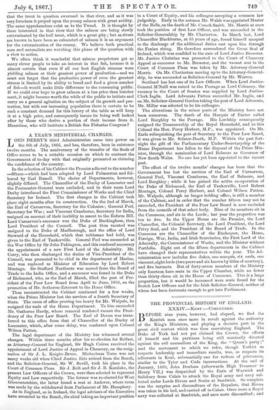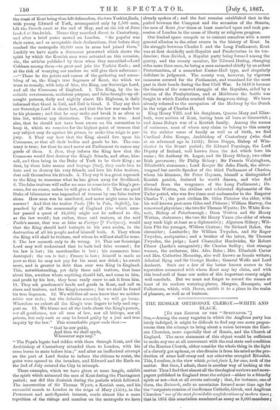B EFORE nine years, however, had elapsed, we find the Kentish
men once more in revolt against the authority of the King's Ministers, and playing a decisive part in the great civil contest which was then convulsing England. The Duke of York had not yet claimed the Crown, the efforts of himself and his partizans being still nominally directed against the evil counsellors of the King, the " Queen's party ;" and the movement to which we refer, though Yorkist as respects leadership and immediate results, was, as respects its adherents in Kent, substantially one for redress of grievances, similar to the Tyler and Cade insurrections. At the end of January, 1460, John Denham (afterwards High Treasurer to Henry VII.) was despatched by the Earls of Warwick and Salisbury from Calais to attack the Royal army and navy col- lected under Lords Rivers and Scales at Sandwich. So complete was the surprise and discomfiture of the Royalists, that Rivers was taken in his bed, and carried off to Calais. Once more a Royal navy was collected at Sandwich, and once more discomfited ; and the coast of Kent being thus left defenceless, the two Yorkisaarls, with young Edward of York, accompanied only by 1,500 men, left the French coast at the end of May, and on the 5th of June landed at Sandwich. Hence they marched direct to Canterbury, and after a brief pause moved on London. " So popular was their cause, and so acceptable their declarations, that before they reached the metropolis 40,000 men in arms had joined them." Luckily we have again a document preserved which shows the spirit by which the Kentish men were actuated on this occasion, viz., the articles published by them when they assembled—Lord Cobham among them—to greet and join the Yorkist Earls ; and at the risk of wearying our readers we will give their substance : —" These be the points and causes of the gathering and assem- bling of us, the King's true liegemen of Kent, the which we trust to remedy, with help of him, the King, our Sovereign Lord, and all the Commons of England. 1. The King, by the in- satiable covetousness, malicious purpose, and false-brought-up-of- naught persons, daily and nightly about His Highness, is daily informed that Good is Evil, and Evil is Good. 2. They say that our Sovereign Lord is above law, and that the law was made but to his pleasure ; and that he may make and break it as often as him list, without any distinction. The contrary is true. And also, that he should not have been sworn on his coronation to keep it, which we conceive for the highest point of treason that any subject may do against his prince, to make him reign in per- jury. 3. They say how that the King should live upon his Commons, so that all their bodies and goods be his. The con- trary is true; for then he need never set Parliament to assess any goods of them. 4. Item, they inform the King bow that the Conunons would first destroy the King's friends, and after, him- self, and then bring in the Duke of York to be their King ; so that, by these false means and lesyngs [lies], they made him to hate and to destroy his very friends, and love hie false traitors, that call themselves his friends. 5. They say it is a great reproach to the King to reassume what he has given away for livelihood. 6. The false traitors will suffer no man to come into the King's pre- sence, for no cause, unless he will give a bribe. 7. That the good Duke of Gloucester was impeached of treason by one false traitor alone. How soon was he murdered, and never might come to his answer And that the traitor Poole [Do la Pole, Suffolk], im- peached by all the commonalty of England (the which num- ber passed a quest of 24,000) might not he suffered to die, as the law would ; but rather, these said traitors, at the said Poole's assent, that was as false as Forager Vortigern], would that the King should hold battayle in his own realm, in the destruction of all his people and of himself both. 8. They whom the King will shall be traitors, and whom he will not shall be none. 9. The law seemeth only to do wrong. 10. That our Sovereign Lord may well understand that he hath had false counsel ; for his law is lost ; his merchandize is lost; his commerce bene destroyed ; the sea is lost ; France is lost ; himself is made so poor so that he may not pay for his meat nor drink ; he oweth more, and is greater in debt than ever was King in. England. This, notwithstanding, yet daily these said traitors, that bene about him, awaiten where anything should fall, and come to him, and profit by his law, they bene ready enow to ask it from him. 11. They ask gentlemen's-lands and goods in Kent, and call us risers and traitors, and the King's enemies ; but we shall be found his true liegemon. 12. We will that all men know that we neither robbe nor stele ; but the defaults amended, we will go home. Wherefore we exhort all the Kiug's true liegers to help and sup- port us. 13. We blame not all the lords about the King's person, nor all gentlemen, nor all men of law, nor all bishops, nor all priests, but only such as may be found guilty by a just and true inquiry by the law." This remarkable paper ends thus :-
" God be our guide, And then we shall spede, Whosoever says nay."
" The Pope's legate had ridden with them through Kent, and the Archbishop of Canterbury attended them to London, with his cross borne in state before him ;" and after an ineffectual attempt on the part of Lord Scales to induce the citizens to resist, the gates were opened to the invaders, and Edward and the Earls on the 2nd of July entered the City in triumph.
These examples, which we have given at some length, exhibit the spirit which animated the men of Kent during the Plantagenet period ; nor did this diminish during the periods which followed. The insurrection of Sir Thomas Wyatt, a Kentish man, and his successful march to London in the reign of Mary (1554), in the Protestant and anti-Spanish interest, reads almost like a mere repetition of the risings and marches on the metropolis we have
already spoken of ; and the fact remains established that in the period between the Conquest and the accession of the Stuarts, the men of Kent four times at least marched upon and took pos- session of London in the cause of liberty or religious progress.
Our limited space compels us to content ourselves with a more general allusion to the other events in the history of Kent. In the struggle between Charles I. and the Long Parliament, Kent was at first decidedly anti-Royalist and Presbyterian in its ten- dencies; then divided, a Royalist party being formed among the gentry, and the county member, Sir Edward Dering, changing sides more than once, he being a man animated chiefly by an ardent Protestantism, of a somewhat Exeter-Hall type, and singularly deficient in judgment. The county was, however, by vigorous measures secured for the Parliament, and remained for the most part in their hands during the first Civil War. In 1618 it became the theatre of the renewed struggle of the Royalists, aided by a section of the Presbyterians, and at Maidstone the battle was fought in which Fairfax crushed this dangerous rising. We have already referred to the occupation of the Medway by the Dutch in the reign of Charles II.
King Henry VIII. and his daughters, Queens Mary and Eliza- beth, were natives of Kent, having been all born at Greenwich ; and Anna Boleyn was of a Kentish family. Among the names of eminence, most of whom may claim to belong to this county in the stricter sense of family as well as of birth, we find Cardinal John Kempe, Archbishop of Canterbury (who died at an advanced age in 1453) ; Brion Duppa, Bishop of Win- chester in the Stuart period ; Sir Edward Poynings, the Lord Deputy of Ireland, well known from the Act which bore his name ; Sir Anthony St. Leger, and Sir Henry Sidney, two other Irish governors ; Sir Philip Sidney; Sir Francis Walsingham, Elizabeth's statesman ; Lord Keeper Sir John Finch, the silver- tongued but servile Speaker of the third Parliament of Charles, whom his kinsman, Sir Peter Heyman, himself a distinguished Kentish patriot, declared he would disown, and who fled abroad from the vengeance of the Long Parliament ; Dr. Nicholas Wotton, the civilian and celebrated diplomatist of the Tudor period, who was five times sent ambassador to the Emperor Charles V. ; the poet civilian Dr. Giles Fletcher the elder, with his well known poet-sons Giles and Phineas ; William Harvey, the renowned physician ; the two Sir Thomas Wyatts ; Dr. White Ken- nett, Bishop of Peterborough ; Dean Wotton and Sir Henry Wotton, statesmen ; the two Sir Henry Vanes (the elder of whom may rank high at least as a diplomatist) ; Algernon Sidney ; Wil- liam Pitt the younger, William Caxton ; Sir Richard Baker, the chronicler ; Lanbarde ; Sir William Twysden, and Sir Roger Twysden, antiquaries ; and a brother of the latter, Sir Thomas Twysden, the judge ; Lord Chancellor Hardwicke, Sir Robert Filmer (Locke's antagonist) ; Sir Charles Seclley ; that strange woman, the authoress, Mrs. Afra 13ehn ; Mrs. Elizabeth Carter and Mrs. Catherine Macaulay, also well known as female writers ; Admiral Byng and Sir George Rooke ; General Wolfe and Lord Amherst. Such are a few of the better known names to the reputation connected with whom Kent may lay claim, and with this bead-roll of fame our notice of this important county might well conclude. But we must not forget to record the names at leant of its modern watering-places, Margate, Ramsgate, and Folkestone, which, with Dover, entitle it to a place in the realm of pleasure, as well as of business.































 Previous page
Previous page